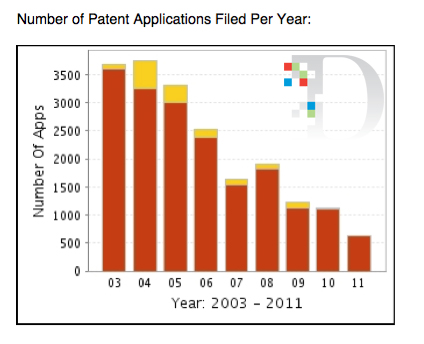Is Innovation at HP Dead?
 Hewlett-Packard CEO Léo Apotheker once said he hoped that “one day people will say ‘this is as cool as HP,’ not ‘as cool as Apple.’” But now that the company has abandoned its webOS hardware business and begun “exploring strategic alternatives” for its PC business, that day will never come.
Hewlett-Packard CEO Léo Apotheker once said he hoped that “one day people will say ‘this is as cool as HP,’ not ‘as cool as Apple.’” But now that the company has abandoned its webOS hardware business and begun “exploring strategic alternatives” for its PC business, that day will never come.
Not that it would have ever come, anyway. Because HP is no longer the innovator it once was. In fact, some would argue that innovation at HP is dying — if it’s not dead already.
“The market worries about the precise fate of HP’s PC business,” says Christopher Marlett, CEO of boutique investment bank MDB Capital, which specializes in intellectual property. “But the real story with HP is that it’s no longer an innovative company.”
According to Marlett, innovation at HP has been in decline for years now, gutted by leadership that tried to bolster profits by cutting R&D. According to some reports HP’s research and development budget used to be 9 percent of revenue. These days it’s more like 2 percent. So much for those “7 Immutable Laws of Innovation” …
 “Look at the number of patent applications that HP has filed in the past five years,” he says. “The company has really just fallen off the cliff as far as innovation is concerned. And it cannot afford to do that. It has to innovate, because you can’t buy your way to relevance in this industry.”
“Look at the number of patent applications that HP has filed in the past five years,” he says. “The company has really just fallen off the cliff as far as innovation is concerned. And it cannot afford to do that. It has to innovate, because you can’t buy your way to relevance in this industry.”
HP certainly couldn’t. As Apotheker said last week the ramp-up on the webOS hardware business it acquired from Palm was far too long and the hundreds of millions of dollars in losses it was generating was a real drag on the company.
“HP’s hardware business is eroding; the brand is losing relevancy,” says Marlett. “Frankly, HP should probably shoot its hardware division in the head and bury it … or sell it to Dell.”
In other words, it’s no longer “HP Invent,” it’s “HP Divest.” HP’s hallowed culture of innovation is a skeleton of what it once was.
Thank God for the printer business, right?
Maybe. Marlett worries about that as well.
“The printer business is eroding too,” he insists. “Not only is there competition, but HP can’t maintain the same margins on ink cartridges that it has in the past. Then there’s new technology being developed that will revolutionize the entire printer space. But again HP hasn’t been innovating, so they’ve really got nothing in the pipeline. Don’t get me wrong, the printing business is a good business to focus on, but HP needs to work hard to protect that franchise. Really, it’s desperation time for them. They’ve got to begin innovating, because they’ll never acquire their way to shareholder value.”
That’s a bleak assessment of a once great technology icon and one that Marlett says is a good lesson for the industry. “The lack of a robust product pipeline, the acquisition spree that they are trying to rationalize — this is what happens when innovation stops. This is the big story.”
Perhaps. Or perhaps it’s just a bad chapter in a longer one.
Gartner analyst Michael Gartenberg maintains that all is not lost on the HP innovation front and that in the end, things may not be quite as bleak as they seem.
“There’s been a lot of consumer innovation at HP, driving forward initiatives such as touch on Windows 7, working on new categories such as living room PCs and services such as mobile printing,” Gartenberg observes. That said, he concedes that there is uncertainty around HP’s strategy going forward. “As HP transitions, it does raise questions about what their role will be in the growing consumer technology marketplace.”
[Image credit: Chart courtesy MDB Capital]









